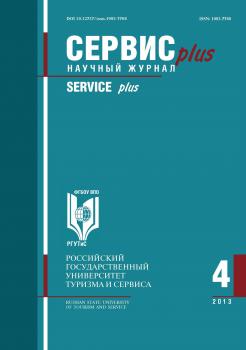St. Petersburg, Russian Federation
St. Petersburg, Russian Federation
At the present level of economic systems development and transformation of social relations more and more attention is paid to the innovative form development of running economic activity in all industries and sectors of national and world economy. One of these forms claims to be the cluster structure, which finds wide application in industry and agricultural sector as well as in the conditions of service economy. The emergence of tourism clusters is a quite natural result of this process, which finds its confirmation not only in theoretical researches of scientists, but also in domestic and foreign experience. The cluster creation helps to maximize the effectiveness of the tourist resource use to ensure effective functioning of specific destination to meet the consumer’s demands on tourism and recreational services. Special attention in the development and implementation of cluster initiatives should be paid to the cluster structure. One of the most important members of any cluster, according to the authors, should be tourist information centers. As foreign experience shows, tourist information centers can be considered the main body of the tourism cluster, which helps to synchronize and harmonize the efforts of all stakeholders. The authors made a comprehensive research based on their own methods of tourist business representatives’ opinions on the functioning of the regional tourist information centers with the requisite infrastructure in terms of tourist cluster. Obtained representative data allow to formulate a number of conclusions about the competitiveness enhancing of the tourist market in terms of specific municipal areas of the Leningrad region taking into account policy management of tourist destinations based on principles of clustering.
tourism cluster, participants of tourism cluster, competitiveness of tourist destinations, analysis of expert opinion, economy and management in the service industry
1. Gorbashko E.A., Dyukov I.I. Konkurentosposobnost' i problemy ekonomicheskogo razvitiya Rossii // Standarty i kachestvo. 2015. № 9. S. 98-101.
2. Grishin S.Yu. Upravlenie regional'nymi turistskimi klasterami. Monografiya. SPb.: Izd-vo SPbGEU. 2016. 209 s.
3. Grishin S.Yu., Kontonistov O.E. Rol' i znachenie gosudarstvennogo regulirovaniya v usloviyah sovremennogo turistskogo rynka // Sovremennye aspekty ekonomiki. 2016. № 2 (222). S. 20-24.
4. Karpova G.A., Valeeva E.O. Razvitie turizma kak konkurentnoe preimuschestvo territorii (na primere sub'ektov SZFO) // Izvestiya Sankt-Peterburgskogo gosudarstvennogo ekonomicheskogo universiteta. 2015. № 1 (91). S. 44-51.
5. Karpova G.A., Sigova M.V., Shevchenko E.P. Brending regiona kak instrument povysheniya privlekatel'nosti tu-ristskoy destinacii // Vestnik Nacional'noy akademii turizma. 2014. № 1 (29). S. 72-75.
6. Kruzhalin V.I., Kruzhalin K.V., Shabalina N.V. Sostoyanie rossiyskogo turizma, problemy i perspektivy // Vestnik Nacional'noy akademii turizma. 2016. № 1. S. 10-13.
7. Pesockaya E.V. Etologicheskiy podhod v upravlenii turistskimi uslugami // Izvestiya SPbGEU. 2016. № 3 (99). S. 92-97.
8. Pesockaya E.V., Mnyakin M.G. Marketingovye mehanizmy upravleniya turistskoy organizaciey // Sovremennye aspekty ekonomiki. 2013. № 4 (188). S. 170-176.
9. Chudnovskiy A.D., Zhukov M.A. Upravlenie industriey turizma Rossii v sovremennyh usloviyah. Uchebnoe posobie. M.: KNORUS, 2017. S. 416.
10. Cooke R. Martin (red.), Clusters and Regional Development. Critical Reflections and Explorations, London: Routledge. 2012. 425 p.
11. Nordin S. Tourism Clustering & Innovation - Paths to Economic Growth & Development // European Tourism Research Institute/ Mid-Sweden University/ SE-831 25 Östersund, Sweden. 2011 g. 186 p.
12. Solvell O., The Cluster Initiative Greenbook CIND, Uppsala University, ISC, Harvard Business School, TSI Global Conference, Gothenburg. 2012. 391 p.
13. UNIDO, Development of clusters and networks of SME, The UNIDO Programme. Vienna. 2011. 54 p.
14. Van der Linde C., Class : The Demography of Clusters - Finding from the Cluster Meta-Study. New York. 2013. 314 p.

















